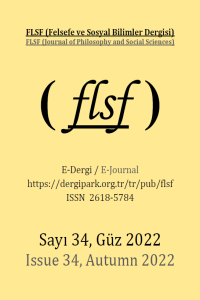MARX’IN İNSAN ANLAYIŞINA İLİŞKİN ÇAĞDAŞ BİR TARTIŞMA: İNSAN DOĞASI İNSANA ÖZGÜ NİTELİKLER İLE SINIRLANDIRILABİLİR Mİ?
Abstract
Marx’ın belirli bir insan doğası anlayışına sahip olup olmadığı meselesi felsefi literatürde hala tartışılmaktadır. Chris Byron bu konu üzerine yakın zamanda kaleme aldığı bir çalışmasında söz konusu tartışmanın bütün taraflarını tatmin edeceğini düşündüğü bir iddia dile getirir. Byron’a göre insan doğasından, sadece insana ait özellikler anlaşılmalıdır. İnsan doğasını kavramsal olarak bu şekilde sınırlandıran Byron, Marx’ın insan doğası anlayışının temelinde de emeğin yer aldığını söyler. Fakat yazarın, insan doğasının kapsamına dair dile getirdiği düşünce çeşitli sorunlar barındırır. İlk olarak, insan doğasının böyle anlaşılması insanın eksik bir şekilde tanımlanmasına neden olmaktadır. Felsefi anlamda kesin bir tanım, tanımladığı iddiasındaki kavramın hem yeter, hem de zorunlu koşullarını ortaya koymalıdır. Ama insanın ayırıcı özellikleri insan olmanın zorunlu ve yeter koşullarının tümünü kapsamadığı için, bu nitelikler insanı tanımlamakta ve dolayısıyla insan doğasını açıklamakta yetersiz kalmaktadır. İkinci olarak, insan doğasının yalnızca insana ait özelliklerden oluştuğu iddiası, bizzat Byron’un insan doğasını emeğe dayandırma çabasına zarar vermektedir. Çünkü tarih içinde gelişen farklı biçimleriyle emek sürecinin temel amacı her zaman insan ihtiyaçlarının karşılanması olmuştur ve bu ihtiyaçların birçoğu da yalnızca insana ait özellikler ile açıklanamaz. Yani insanın diğer varlıklarla paylaştığı özellikler de göz önüne alınmadan ne emeğin tarihteki yaratıcı ve ilerletici rolü, ne de emek ile insan doğası arasındaki ilişki sağlıklı bir şekilde kavranabilir.
References
- Althusser, Louis. Pour Marx. 3. Baskı. Paris: La Découverte, 2005.
- Byron, Chris. “A Critique of Sean Sayers’ Marxian Theory of Human Nature.” Science & Society 78, no 2 (2014): 241–248.
- Engels, Friedrich ve Karl Marx. “The German Ideology.” içinde Marx & Engels Collected Works, cilt 5, 19-539. Lawrence & Wishart Electric Book, 2010.
- Geras, Norman. Marx and Human Nature. 1. Baskı. Londra: Verso, 1983.
- Marx, Karl. “Theses On Feuerbach.” içinde Marx & Engels Collected Works, cilt 5, 6-8. Lawrence & Wishart Electric Book, 2010.
- Marx, Karl. “Value, Price and Profit.” içinde Marx & Engels Collected Works, cilt 20, 101-149. Lawrence & Wishart Electric Book, 2010.
- Marx, Karl. “Economic Manuscripts of 1857-58.” içinde Marx & Engels Collected Works, cilt 28, 5-540. Lawrence & Wishart Electric Book, 2010.
- Marx, Karl. “Capital: A Critique of Political Economy.” içinde Marx & Engels Collected Works, cilt 35, 7-764. Lawrence & Wishart Electric Book, 2010.
- Sayers, Sean. Marxism and Human Nature. 1. Baskı. Londra: Routledge, 1998.
A RECENT DISCUSSION ABOUT MARX’S CONCEPT OF HUMAN: CAN HUMAN NATURE BE LIMITED BY EXCLUSIVELY HUMAN CHARACTERISTICS?
Abstract
Whether Marx has a conception of human nature is still debated in philosophical literature. In a recent article, Chris Byron presents a claim and he thinks that it would satisfy all parties in this debate. According to Byron, human nature should be understood as exclusively human characteristics. After this conceptual limitation he also suggests that Marx’s understanding of human nature is based on labour. But Byron’s claim regarding the extent of human nature create some problems. First of all, his understanding of human nature causes a deficient human definition. Precise definition, in a philosophical sense, must include all the necessary and sufficent conditions of the thing it defines. But, because distinctive human characteristics do not imply all the necessary and sufficent conditions of human-beings, these attributes fall short of defining the human-being and explaining human nature. Secondly, the understanding of human nature based on distinctive human characteristics undermines Byron’s own claim that Marx’s conception of human nature should be grounded on labour. Throughout the history and in various ways, process of labour’s primary goal has always been the satisfaction of human needs. But most of these needs can not be explained by exclusively human characteristics. Without taking into account the attributes that humans share with other beings, neither the creative and progressive role of labour in history, nor the relation between labour and human nature can be grasped properly.
Keywords
Karl Marx Human Nature Chris Byron Labour Production Trans-Historical Biological Characteristics
References
- Althusser, Louis. Pour Marx. 3. Baskı. Paris: La Découverte, 2005.
- Byron, Chris. “A Critique of Sean Sayers’ Marxian Theory of Human Nature.” Science & Society 78, no 2 (2014): 241–248.
- Engels, Friedrich ve Karl Marx. “The German Ideology.” içinde Marx & Engels Collected Works, cilt 5, 19-539. Lawrence & Wishart Electric Book, 2010.
- Geras, Norman. Marx and Human Nature. 1. Baskı. Londra: Verso, 1983.
- Marx, Karl. “Theses On Feuerbach.” içinde Marx & Engels Collected Works, cilt 5, 6-8. Lawrence & Wishart Electric Book, 2010.
- Marx, Karl. “Value, Price and Profit.” içinde Marx & Engels Collected Works, cilt 20, 101-149. Lawrence & Wishart Electric Book, 2010.
- Marx, Karl. “Economic Manuscripts of 1857-58.” içinde Marx & Engels Collected Works, cilt 28, 5-540. Lawrence & Wishart Electric Book, 2010.
- Marx, Karl. “Capital: A Critique of Political Economy.” içinde Marx & Engels Collected Works, cilt 35, 7-764. Lawrence & Wishart Electric Book, 2010.
- Sayers, Sean. Marxism and Human Nature. 1. Baskı. Londra: Routledge, 1998.
Details
| Primary Language | Turkish |
|---|---|
| Subjects | Philosophy |
| Journal Section | Research Article |
| Authors | |
| Publication Date | December 10, 2022 |
| Submission Date | June 22, 2022 |
| Acceptance Date | November 15, 2022 |
| Published in Issue | Year 2022 Issue: 34 |
Cited By
İktidarın Kaçınılmazlığını İhmal Etmek: Marksist ve Anarşist Devlet Kuramının Bir Eleştirisi
Giresun Üniversitesi İktisadi ve İdari Bilimler Dergisi
https://doi.org/10.46849/guiibd.1518223
Starting from 2024, our journal will be published in 3 issues as two regular and one special issues. These issues will be published In May (regular issue), September (special issue) and December (regular issue).
Only articles within the scope of the file will be included in our special issue.
Thank you for your attention.

